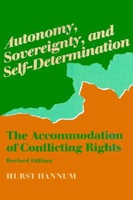Difference between revisions of "Self-determination"
m (Text replacement - "http://" to "https://") |
|||
| Line 1: | Line 1: | ||
[[File:lighterstill.jpg]][[File:Self_determination.jpg|right|frame]] | [[File:lighterstill.jpg]][[File:Self_determination.jpg|right|frame]] | ||
| − | *Date: circa [ | + | *Date: circa [https://www.wikipedia.org/wiki/17th_Century 1670] |
==Definitions== | ==Definitions== | ||
*1 : free choice of one's own acts or states without external compulsion | *1 : free choice of one's own acts or states without external compulsion | ||
| Line 8: | Line 8: | ||
'''Self-determination''' is the [[free]] [[choice]] of one’s own [[acts]] without external [[Coercion|compulsion]]. In [[politics]] it is seen as the [[freedom]] of the people of a given territory or national grouping to determine their own [[political]] [[status]] and how they will be governed without undue [[influence]] from any other country. There are conflicting definitions and [[legal]] criteria for determining which [[groups]] may legitimately claim the right to self-determination. | '''Self-determination''' is the [[free]] [[choice]] of one’s own [[acts]] without external [[Coercion|compulsion]]. In [[politics]] it is seen as the [[freedom]] of the people of a given territory or national grouping to determine their own [[political]] [[status]] and how they will be governed without undue [[influence]] from any other country. There are conflicting definitions and [[legal]] criteria for determining which [[groups]] may legitimately claim the right to self-determination. | ||
==Origins== | ==Origins== | ||
| − | Just as colonisation and [ | + | Just as colonisation and [https://en.wikipedia.org/wiki/Colonialism colonialism] have been [[practiced]] throughout recorded [[history]], political self-determination, on an [[individual]] level, has been documented similarly and cherished highly by people despite them; ancient [https://en.wikipedia.org/wiki/Mesopotamia Mesopotamia] and the later [https://en.wikipedia.org/wiki/Polis Greek city-states] are early examples of its [[practice]]. The employment of [https://en.wikipedia.org/wiki/Imperialism imperialism], through the expansion of empires, and the [[concept]] of [[political]] [[sovereignty]], as developed after the [https://en.wikipedia.org/wiki/Treaty_of_Westphalia Treaty of Westphalia], also explain the emergence of self determination during the [https://en.wikipedia.org/wiki/Modern_history Modern Era]. During, and after, the [https://en.wikipedia.org/wiki/Industrial_Revolution Industrial Revolution] many [[groups]] of people recognized their [[shared]] [[history]], geography, [[language]], and [[customs]]. [https://en.wikipedia.org/wiki/Nationalism Nationalism] emerged as a uniting [[ideology]] not only between competing powers, but also for groups that felt subordinated or disenfranchised inside larger states, in this situation self determination can be seen as a reaction to imperialism. Such groups often pursued [[independence]] and [[sovereignty]] over territory, but sometimes a different sense of [[autonomy]] has been pursued or achieved. |
==Current Issues== | ==Current Issues== | ||
| − | Since the early [ | + | Since the early [https://www.wikipedia.org/wiki/1990's 1990s], the legitimatization of the principle of national self-determination has led to an increase in the [[number]] of [[conflicts]] within [[states]], as sub-groups seek greater self-determination and even full [[secession]], and as their conflicts for [[leadership]] within [[groups]] and with other groups and with the dominant state become [[violent]]. The international [[reaction]] to these new [[movements]] has been uneven and often dictated more by politics than principle. The year 2000 United Nations Millennium Declaration failed to deal with these new demands, mentioning only “the right to self-determination of peoples which remain under colonial domination and foreign occupation.”[https://en.wikipedia.org/wiki/Self-determination] |
[[Category: Political Science]] | [[Category: Political Science]] | ||
Latest revision as of 01:49, 13 December 2020
- Date: circa 1670
Definitions
- 1 : free choice of one's own acts or states without external compulsion
- 2 : determination by the people of a territorial unit of their own future political status
Description
Self-determination is the free choice of one’s own acts without external compulsion. In politics it is seen as the freedom of the people of a given territory or national grouping to determine their own political status and how they will be governed without undue influence from any other country. There are conflicting definitions and legal criteria for determining which groups may legitimately claim the right to self-determination.
Origins
Just as colonisation and colonialism have been practiced throughout recorded history, political self-determination, on an individual level, has been documented similarly and cherished highly by people despite them; ancient Mesopotamia and the later Greek city-states are early examples of its practice. The employment of imperialism, through the expansion of empires, and the concept of political sovereignty, as developed after the Treaty of Westphalia, also explain the emergence of self determination during the Modern Era. During, and after, the Industrial Revolution many groups of people recognized their shared history, geography, language, and customs. Nationalism emerged as a uniting ideology not only between competing powers, but also for groups that felt subordinated or disenfranchised inside larger states, in this situation self determination can be seen as a reaction to imperialism. Such groups often pursued independence and sovereignty over territory, but sometimes a different sense of autonomy has been pursued or achieved.
Current Issues
Since the early 1990s, the legitimatization of the principle of national self-determination has led to an increase in the number of conflicts within states, as sub-groups seek greater self-determination and even full secession, and as their conflicts for leadership within groups and with other groups and with the dominant state become violent. The international reaction to these new movements has been uneven and often dictated more by politics than principle. The year 2000 United Nations Millennium Declaration failed to deal with these new demands, mentioning only “the right to self-determination of peoples which remain under colonial domination and foreign occupation.”[1]
